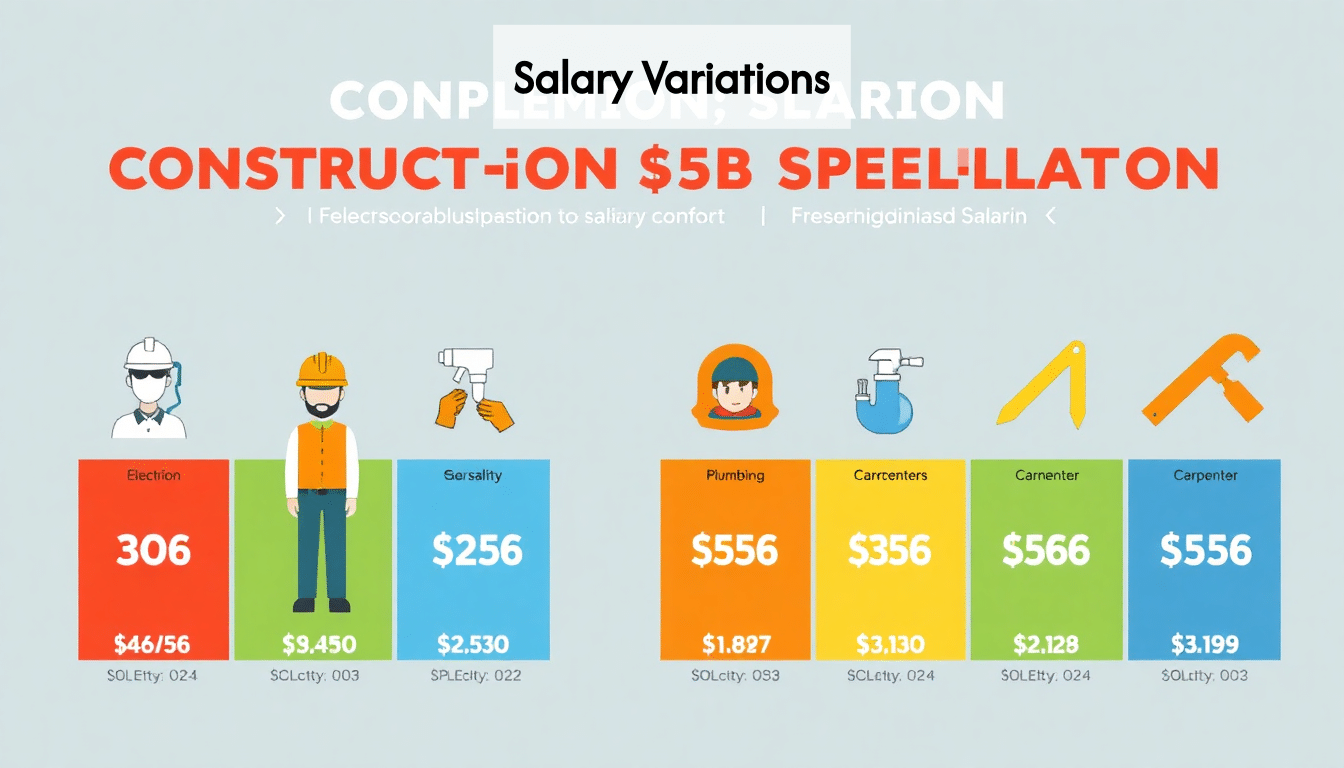Surveying Today’s Salaries: How Much Do Construction Workers Make?
Construction workers in the United States earn a median annual wage of $37,520, according to the Bureau of Labor Statistics’ most recent data. However, actual earnings vary significantly based on specialization, experience, location, and union membership.
Hourly rates typically range from $14 to $36, with the average construction worker making approximately $18 per hour. When considering annual figures, construction workers make between $29,000 and $75,000 depending on their specific role and qualifications.
Salary variations by specialization include:
- General laborers: $35,800 average annual salary
- Equipment operators: $49,100 average annual salary
- Skilled carpenters: $52,850 average annual salary
- Electricians: $60,040 average annual salary
- Plumbers: $59,880 average annual salary
Location dramatically impacts earnings. For example, construction workers in metropolitan areas like New York City and San Francisco can earn up to 40% more than the national average, while those in rural regions might earn 15-20% less.
Union membership also boosts earnings substantially. Data from the Economic Policy Institute shows unionized construction workers earn approximately 22% more than their non-union counterparts, in addition to receiving better benefits packages.
Key Takeaways
| Key Point | Details |
|---|---|
| Median Earnings | The median annual wage for construction workers is $37,520, with hourly rates ranging from $14 to $36. |
| Variability in Salaries | Earnings greatly vary by specialization, experience, and location, affecting annual salaries from $29,000 to $75,000. |
| Impact of Union Membership | Unionized workers earn 22% more on average than non-union workers, including better benefits. |
| Experience Matters | Entry-level workers earn between $15-17 per hour, while experienced workers can earn $25-30+ per hour based on skill level. |
| Geographic Disparities | Salaries differ significantly by state, with construction workers in California averaging $49,590 while those in Mississippi earn around $32,170. |
Key Factors That Influence Construction Worker Earnings

The substantial variation in construction worker salaries stems from several key factors that directly impact earning potential in the industry.
Experience and Skill Level
Experience significantly affects how much construction workers make, with entry-level positions starting around $15-17 hourly while veterans with 10+ years of experience can command $25-30+ per hour. According to the Construction Labor Research Council, skilled workers earn approximately 45% more than unskilled laborers in the same region.
Specialization and Certification
Specialized skills and certifications dramatically increase construction worker wages:
- Heavy equipment operators earn 28% above general laborers
- Certified welders command 34% premium over average construction worker salary
- OSHA certification adds $2-4 per hour to base wages
- Scaffold specialists average $5-7 hourly premium
Geographic Location
Location remains perhaps the most significant determinant of construction salary ranges. California construction workers average $49,590 annually, while those in Mississippi earn approximately $32,170 for similar positions – a 54% difference.
Union Membership
Union representation creates substantial wage advantages. The Economic Policy Institute found union construction workers receive comprehensive benefits packages worth $11.75/hour on average, compared to $3.49/hour for non-union workers – creating a total compensation gap of over 30% when combined with higher hourly wages.
Hourly Rates vs. Salaried Positions: Breaking Down the Numbers

Construction compensation structures vary between hourly wages and salaried positions, each offering different financial implications for workers.
Hourly construction workers typically earn between $14-$36 per hour depending on specialization and location. These positions benefit from overtime pay, often at 1.5x the standard rate after 40 hours weekly. For a concrete example, a journeyman carpenter earning $25/hour who works 50 hours weekly would make $1,375 ($1,000 base + $375 overtime) – significantly more than their base 40-hour earnings.
Salaried positions, more common in management roles, offer stability but sometimes lower total compensation compared to high-overtime hourly positions. Construction project managers earn a median annual salary of $76,500 according to PayScale data, with regular working hours but no overtime premium.
The financial comparison reveals interesting patterns:
- Hourly workers: Higher earning potential during busy seasons (overtime compensation)
- Salaried workers: More stable income during seasonal slowdowns
- Hourly specialists: Often out-earn entry-level salaried positions by 15-20% when including overtime
- Salaried positions: Typically include better benefits packages worth $8,000-$12,000 annually
A 2021 industry survey by the Associated General Contractors of America found that 72% of journeyman-level workers preferred hourly compensation with overtime potential versus comparable salaried positions, citing the ability to maximize earnings during peak seasons as the primary motivation.
Regional Variations and Industry Trends in Construction Wages
Construction worker salaries exhibit substantial geographic variation across the United States, with regional economic conditions, cost of living, and local demand for skilled labor creating significant wage disparities.
The highest-paying regions for construction workers include:
- New York metropolitan area: $52,940 average annual salary
- San Francisco Bay Area: $51,260 average annual salary
- Boston: $49,780 average annual salary
- Seattle: $48,620 average annual salary
- Chicago: $47,340 average annual salary
By contrast, construction workers in rural areas and southern states often earn substantially less. In Mississippi, the average construction worker salary is just $32,170 annually – a 65% difference compared to top-paying markets.
Industry trends show promising wage growth. According to the Associated Builders and Contractors, construction wages have increased by 3.2% annually over the past five years, outpacing the national average of 2.9% across all industries. This trend reflects the ongoing skilled labor shortage, with 89% of contractors reporting difficulty finding qualified workers in a recent industry survey.
Prevailing wage laws also significantly impact earnings in certain regions. In states with strong prevailing wage requirements for public projects, construction workers earn an average of 15-18% more than workers in states without such protections, according to Economic Policy Institute research.
Regional union strength correlates closely with higher wages, with union membership rates above 30% in the Northeast and under 10% in many Southern states mirroring the regional wage disparities.
Addressing Career Concerns: Job Stability and Growth in Construction
Construction offers remarkable job stability and growth potential despite its reputation for seasonal fluctuations. The Bureau of Labor Statistics projects 4% industry growth through 2029, translating to approximately 296,300 new construction jobs – exceeding many other sectors in both percentage and absolute growth.
Employment stability varies by specialization, with some roles offering greater consistency:
- Civil infrastructure specialists: 89% year-round employment rate
- Commercial construction workers: 78% year-round employment rate
- Residential construction workers: 62% year-round employment rate (more seasonal variation)
- Specialized trades (electrical, plumbing): 91% year-round employment rate
Wage growth trajectories show consistent upward momentum. A construction worker starting at entry-level can expect average wage increases of 4.6% annually during their first decade in the industry, according to Construction Industry Resources data. This exceeds the national cross-industry average of 3.1% annual wage growth.
The construction skills gap further enhances career prospects. The Associated Builders and Contractors estimates the industry needs to hire 430,000 additional workers in 2022 alone to meet demand. This shortage creates exceptional advancement opportunities for dedicated workers willing to develop specialized skills.
A concrete example comes from Turner Construction, where 68% of project managers began as field workers, demonstrating the genuine career mobility within the industry. With strategic upskilling, construction workers can boost earnings by 35-60% within 5 years through advancement to specialized or supervisory roles.
Proven Strategies to Boost Your Earnings in the Construction Industry
Construction workers can significantly increase their earning potential through strategic career development. Data shows workers who implement targeted advancement strategies earn 40-70% more than those who remain in entry-level positions.
Skill Certification and Specialization
Specialized certifications deliver immediate wage increases. According to the Construction Labor Research Council, workers who obtain certifications experience an average 12-18% salary boost within six months. High-value certifications include:
- Crane operation certification: $5-8/hour premium
- Welding certification: $4-7/hour premium
- Advanced safety certifications: $3-5/hour premium
- Project management credentials: $15,000-25,000 annual salary increase
Strategic Job Mobility
Regular, strategic job changes accelerate wage growth. Construction professionals who change employers every 3-4 years experience 21% faster wage growth than those who remain with the same company, according to BuildZoom research. This approach works particularly well when moving from residential to commercial or infrastructure projects.
Union Membership
Joining a union remains one of the most effective ways to increase construction earnings. Beyond the direct wage premium (22% on average), union apprenticeship programs provide paid training worth approximately $50,000-$100,000 compared to self-funded education costs.
A real-world example comes from John Deere construction sites, where unionized equipment operators earn $38.75/hour plus comprehensive benefits, while non-union operators at comparable sites average $29.40/hour with limited benefits – a 31.8% total compensation difference.
Frequently Asked Questions
What is the average salary for construction workers in the United States?
According to the Bureau of Labor Statistics, the average annual salary for construction workers is approximately $37,520, with hourly rates ranging from $14 to $36 based on various factors such as experience and specialization.
How do salaries vary by specialization in the construction industry?
Salaries differ significantly by specialization. For example, general laborers earn around $35,800 yearly, while electricians make about $60,040 annually. Specialized roles like certified welders may command even higher rates.
Does union membership impact construction worker salaries?
Yes, unionized construction workers earn about 22% more on average than non-union workers and often receive better benefits packages. Joining a union is a strategic way to increase earnings.
How can construction workers boost their earnings?
Construction workers can increase their earnings through strategic actions such as obtaining specialized certifications, changing jobs every few years, and pursuing union membership. These methods can lead to a salary increase of 40-70% over time.
Unlock Your Earning Potential in Construction 🚀
Are you feeling the pinch of stagnant wages or limited job opportunities in the construction industry? With entry-level construction roles earning between $15-$17 per hour and seasoned professionals hitting $25-$30+, it’s crucial to find the right platform that not only connects you with better-paying jobs but also helps you leverage your skills and certifications for maximum growth.
!
At Amundson Group, we specialize in matching skilled professionals like you with top-tier construction opportunities across various sectors, from heavy civil projects to commercial developments. Whether you aim to join a union, pursue specialized certifications, or switch jobs to boost your income by 40-70%, our extensive network and industry partnerships enhance your journey toward remarkable earnings. Don’t just settle for the average wage—let us help you elevate your career today!
Visit us now and discover how we can advance your career in construction.






